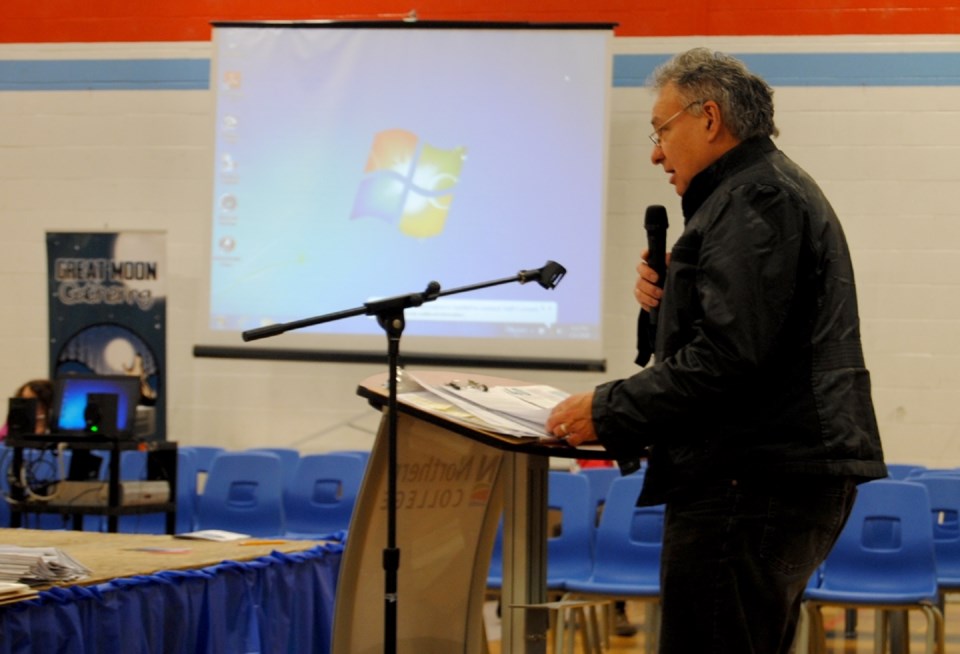The largest ever gathering of First Nation educators in Northeastern Ontario convened at Northern College in Timmins to celebrate the 25th annual Great Moon Gathering.
A total of 350 delegates have registered to attend the two-day conference consisting of 48 workshops and other events including the keynote speech on Thursday by Dr. Shirley Cheechoo, acclaimed filmmaker and the chancellor of Brock University.
“The purpose of the Great Moon Gathering is to improve the awareness of First Nation traditional culture as well curriculum for each educational authority to improve the class room experience of indigenous youth,” explained Michael Baker, vice president of finance, administration and aboriginal services at Northern College.
One of those attending the GMG was John Beck from the Moose Cree First Nation and one of the organizers of the very first event.
“The Great Moon Gathering is not strictly about curriculum concerns of literacy, numeracy, but to reflect on the traditional lifestyle of the communities,” Beck said.
“We bring in teachers to reflect on the culture and the educational needs of the community,” he added. “But it is not only for teachers, educational assistants and others involved with education are also participating.”
Beck explained that many teachers come from outside of the eight Cree communities in Northeastern Ontario that make up the Mushkegowuk Territory. The Great Moon Gathering is a great resource for them to learn more about Cree culture and language.
The gathering also enables educators for the isolated communities to meet and network with each other.
Usually the event is held in one of the eight educational authorities Beck said but since this was the 25th anniversary and a large contingent was expected, Timmins was selected to accommodate the demand.
Last year the GMG was held in Moose Factory, Ontario.
This year, educators from Kapuskasing attended representing the Kap-Kash First Nation school established for students who were moved there because of last spring’s flooding.
They joined the educational authorities from Attawapiskat, Peawanuck, Kashechewan, Fort Albany, Moose Cree, Taykwa Tagamou, Chapleau Cree and Missanabie Cree.
But the annual GMG also attracts those interested in First Nations education from as far away as Thunder Bay and Sault Ste. Marie.
There was a sharing of success and challenges from schools in the Mushkegowuk Territories.
Peetabeck Academy in Fort Albany reported on its Cree language initiative that is continuing despite lack of funding because it is important to community.
St. Andrew’s school in Kashechewan has implemented a breakfast program to help students get a good start to the school day.
Francine J. Wesley Secondary School in Kashechewan has introduced a success through technology program to help empower students by using technology to express themselves.
The Kap-Kash School has focused on building pride and team building through their after school program.
The Delores D. Echum Composite School in Moose Factory also introduced a Cree language program that combines traditional based teaching in an outdoor setting.
Vezina Secondary School in Attawapiskat has introduced a school attendance retention program through the teaching of traditional crafts
The Kattawapiskak Elementary School, the permanent elementary school that opened last year in the community, is also focusing on introducing Cree language classes.
The day’s events were capped with the screening of three films dealing with significant issues for Mushkegowuk First Nations communities.
After the Last River, a film directed by Victoria Lean connects personal stories from Attawapiskat that investigates the impact of the De Beer’s Victor Mine on the community and the environment. Attawapiskat faces numerous crises but according to the film maker, still cannot benefit directly from the revenue generated by the mine’s operation.
Moose River Crossing is a film written and directed by Dr. Shirley Cheechoo and is about six survivors of residential schools who meet on the way to a residential school reunion. Each carries emotional scars from that experience.
Trick or Treaty, directed by Alanis Obomsawin looks at the deception used by representatives of the Ontario and Canadian governments in getting First Nations to sign Treaty 9 in 1905.
After the movies, Northern College hosted a round dance for the delegates to the Great Moon Gathering
Northern College last year signed a protocol with the First Nations communities in which the college pledged itself to become the post secondary institution of choice for First Nation students.
On Friday February 12, Dr. Jean Clinton, professor of child psychiatry at McMaster University and an education advisor for the Premier of Ontario will be the guest speaker.



